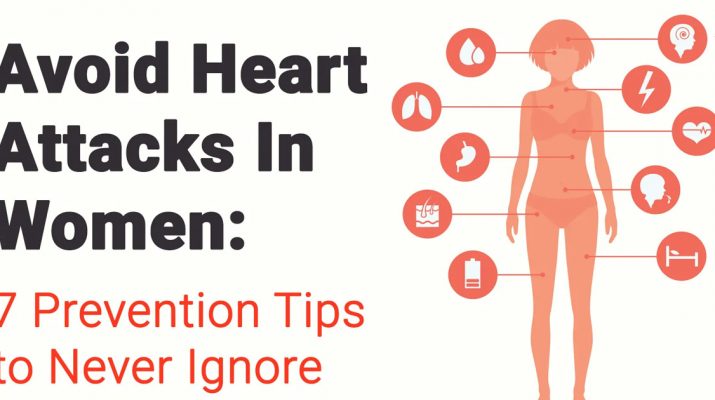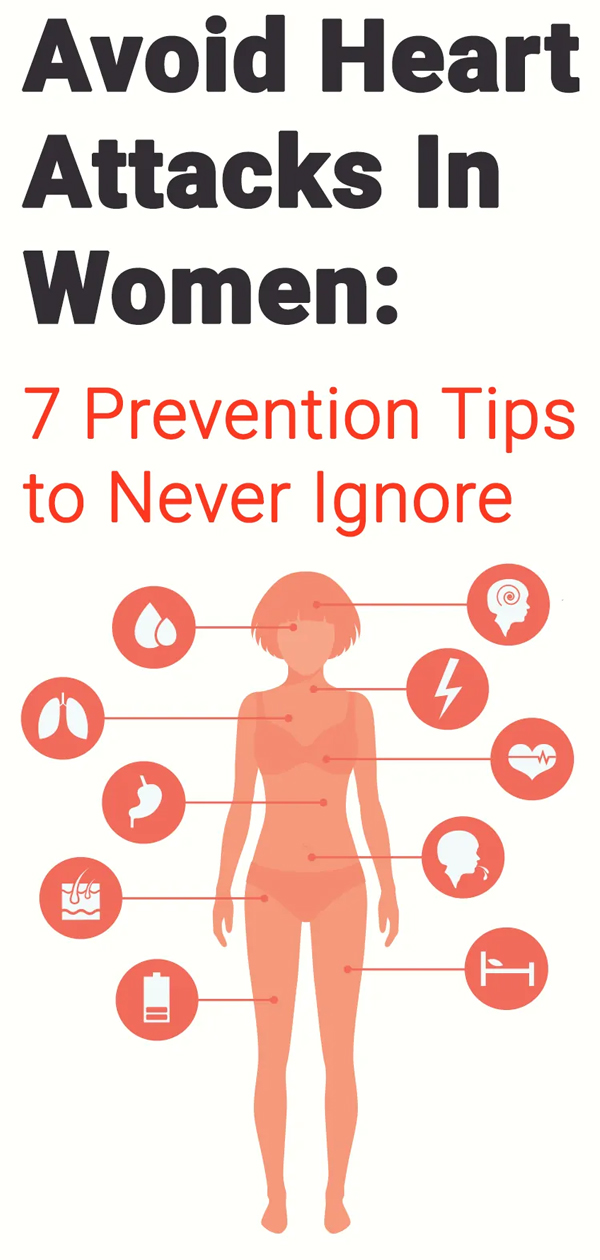Although heart attacks commonly occur among men, the risk factors in women raise alarming concerns. Statistics show that fewer women survive their first heart attack compared to men. It’s also the ladies who mostly suffer through “silent” heart attacks because they don’t experience symptoms of heart diseases the same way as men. As all women face the threat of heart attacks, it is vital to take note of certain prevention tips:
Here Are 7 Heart Attack Prevention Tips To Never Ignore
“Because women don’t expect to have heart disease, a lot of times they don’t seek help if they have the early symptoms of a heart attack.” – Laura Bush
1. Be Responsible When It Comes To Your Health
It goes without saying that the best way to prevent heart attacks is to make sure that you are in good health. As experts always say, early prevention is the next best thing to a cure. If a history of heart disease runs in your family, then you should practice foresight and take responsibility for your health. Visit a doctor and get yourself assessed and tested, so you will be aware of your specific risks and options for treatment if needed.
The biggest mistake you can make is to be misinformed about your health. Aside from consulting with a professional, you can also keep yourself informed about the advances in medicine, particularly when it comes to heart disease. As science develops constantly, previous information about your condition might not be sufficient anymore. Additionally, you have the internet to keep you abreast on the developments.
2. Adopt A Change In Lifestyle To Avoid Heart Attacks
Your doctor will likely advise you to lose weight to lower your risks of heart attacks. Taking concrete steps to adopt a healthy lifestyle is the right way to go. A healthy lifestyle involves a good diet, regular exercises, and quality sleep. Foods that are low in sodium, saturated fats and trans-fat are better for your heart. A 30-minute moderate aerobic activity five days a week also keeps your heart muscles healthier, according to the American Heart Association.
Sleeping an average of eight hours every night helps the body restore and repair itself so that organs, like the heart, function better. Cutting down on vices like smoking or drinking, and even avoiding second-hand smoke, can deliver dramatic results to your heart’s health within a year, according to the Center for Disease Control and Prevention.
3. Reduce The Stress Around You
Aside from making concrete changes to your lifestyle, make an effort to remove or avoid stress. According to the American Medical Association, at least 60 percent of diseases are derived from stress, the number one proxy-killer. Strive to keep the company of positive people in your life so that you laugh more and worry less. Take a break from the demands of your work from time to time and indulge in holidays and breaks to de-stress.
4. Monitor Your Numbers
After a visit to the doctor, take responsibility in monitoring your “numbers”, which includes your heart rate, blood pressure, blood sugar, and cholesterol. These days, there are plenty of personal home devices or fitness gadgets you can use to take the readings. Your doctor might even recommend that you invest in these gadgets so that you won’t have to be inconvenienced by going to the clinic frequently for monitoring.
5. Take Your Pills Properly And Wisely
Follow the treatment or drug therapy plan specifically prescribed for you. If you are considering alternative medications, be sure to discuss this option with your doctor first. While vitamins and supplements like B1, B6, B12, and alpha lipoic acid might help your body become more resilient to disease and heart attacks, taking the pills could interfere with the effects of your current medications.
Supplements are not all manufactured in the same way. Additionally, even if some brands are marketed as “natural,” these might still contain fillers. These are ingredients your body doesn’t need. In the long run, you might be wasting money on pills you think will help, which provide no nutritional benefits. Therefore, it’s always a good idea to talk about pills with your doctor before taking anything.
6. Indulge In Massages And Lovemaking
To counter stress, indulge in the power of touch through massages and lovemaking. Countless studies have shown that touch brings a healing effect that not only reduces physical pain but also transforms negative moods into positive feelings, according to the American Association of Retired Persons(AARP). Touch releases a hormone called oxytocin, also known as the cuddle hormone, that controls the body’s stress levels. Its pleasant and soothing effects work wonders for the blood pressure and the heart.
7. Reduce Screen Time And Spend Time With Nature
A lifestyle dependent on screen time raises the risks for heart disease, according to a study published in BMJ Medicine. Being glued to gadgets promotes a sedentary lifestyle. For this reason, experts recommend a healthy dose of disconnection from the digital world regularly.
Spend time outdoors, among the trees at a park. Leave your smartphone at home, because this is actually good for your heart. A study published in Health and Place showed that women living in an area where there’s a noticeable lack of trees raise their heart disease risk to as much as 25 percent.
Final Thoughts
While positive thinking is the way to go, please remember that following these tips will help you learn more about your body to become proactive about your health and well-being. This is important because as a woman, you are less likely to receive aggressive treatments for heart disease. Also, you have less chance of receiving a referral to a cardiologist as compared to a man. So, take positive control over your health by doing what you can.


